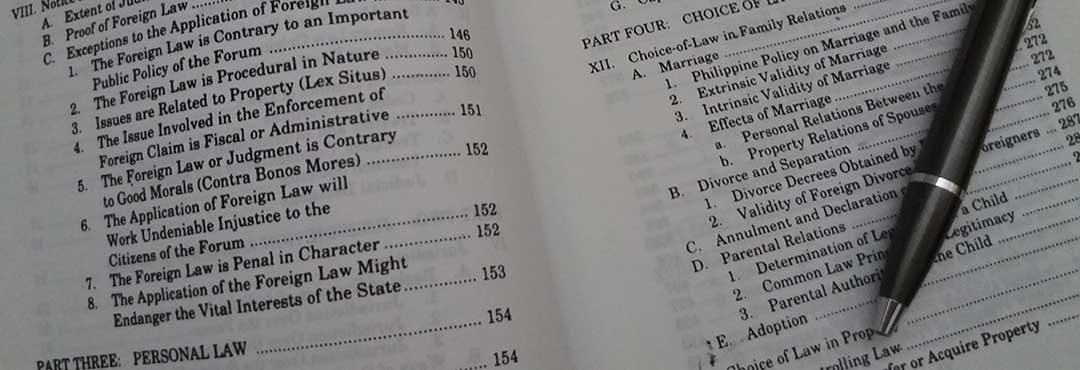A simpler way to divide Conjugal Property

A couple can separate the Marriage Property without going through the acrimonious process of a Legal Separation.
This article covers how to Divide Conjugal Property by discussing how to file Judicial Separation of Property in the Philippines and the Grounds for Judicial Separation of Property.
Spouses of a failing marriage really should consider Judicial Separation of Property. It is a simpler way to divide Conjugal Property when compared to the Annulment vs Legal Separation routes.
Judicial Separation of Property is a court case. It is:
- Faster, cheaper and less difficult than Annulment vs Legal Separation
- It divides Conjugal Property between the Spouses during their lifetime
- It is recommended for when the Spouses already agree how to divide Conjugal Property
- It doesn’t end the marriage (only Annulment does).
An Annulment case will include the dividing of Conjugal Property but it may take twice as long.
Legal Separation also ends the Conjugal Property regime as well but it is expensive, time-consuming, and much more difficult.
Spouses undertake a Judicial Separation of Property because they want to divide Conjugal Property.
This may be because they plan to end their marriage.
Or they want to separate out the property they owned personally before they married from the Conjugal Property.
If you would like to discuss your particular case further you can contact us here.
Contents
- What is Conjugal Property?
- How do you divide Conjugal Property under Legal Separation?
- What is the difference between Legal Separation and Judicial Separation of Property?
- What are the grounds for Judicial Separation of Property?
- How do you file for Judicial Separation of Property in the Philippines?
- Does Judicial Separation of Property impact on the inheritance of our children?
- Can the Marital Property regime be revived after a Judicial Separation of Property?
What is Conjugal Property?
Conjugal Property is income or property generated by both Spouses during their marriage.
In the absence of a Prenuptial Agreement, Philippine Conjugal Property Law sets the property relations between Spouses.
The default Property Regime in Philippine law is Absolute Community of Property.[1]

Houses including the Family Home usually form part of Conjugal Property.
Under the Absolute Community of Property, husband and wife are joint owners of all the properties of the marriage.
Whatever property each Spouse brought into the marriage and all properties acquired during the marriage (with some exceptions) form Conjugal Property.
If the couple’s Community of Property is legally Dissolved, these common properties are divided between them.
It is divided equally or in the proportion the parties have established, irrespective of the value each Spouse may have originally owned.

Clothes are excluded from Conjugal Property during a Judicial Separation of Property as it is for the use of only one Spouse.
The only properties exempted from the Absolute Community of Property are the following:
- Property acquired during the marriage by either Spouse through inheritance, gift, or donation, and the fruits as well as the income of that property, unless the giver specified that the property shall form part of the Community Property.
- Property for personal and exclusive use of either Spouse. However, jewelry is not exempt. Jewelry forms Absolute Community of Property,
- Property acquired before the marriage by either Spouse who has Legitimate Descendants by a former marriage, and the fruits as well as the income, if any, of such property.[1]
How do you divide Conjugal Property under Legal Separation?
I’ve written on this before. In Legal Separation, the Net Profits of the Conjugal Property is awarded to the Innocent Spouse which means that this court case is expensive, time-consuming, and is generally a court battle between the Spouses.
The court determines which of the Spouses is the Innocent Spouse.
Let me explain:
For Legal Separation to be granted by the Court, there must be one guilty Spouse.
The rule is that the guilty Spouse has no right to the Net Profits of the Conjugal Property.
The guilty Spouse’s share of the Net Profits is forfeited in favor of the children or the Innocent Spouse.
You can read more about Legal Separation in the Philippines here.

Shares form part of Conjugal Property
The Net Profits of the Conjugal Property is defined as the increase between the Market Value of that Conjugal Property at the time of the marriage and its Market Value at the time of Dissolution.
This is significant.
It means that, if the Spouses had no assets when they married young, and they built up their assets over the decades since, then the guilty Spouse will have no share in any of these assets because they are all classified as Forfeited Net Profits.

In the case of Legal Separation the Conjugal Properties Net Profits are awarded to the “Innocent” Spouse.
It makes the entire exercise a “winner takes all” contest which discourages compromise.
For this reason, Legal Separation is often disputed, protracted, punitive, and quite draconian.
Nonetheless, Legal Separation is what people often think of when they wish to separate their property from the property of their Spouse.
But there is another way, and that is through Judicial Separation of Property.
What is the difference between Legal Separation and Judicial Separation of Property?
Judicial Separation of Property and Legal Separation are both court cases that end the Conjugal Property Regime but do not end the marriage. However, Judicial Separation of Property is faster, cheaper and far less risky when compared with Legal Separation.
Let’s go through this in detail.
Legal Separation and Judicial Separation of Property are two are different cases based on different parts of the Family Code.[3]
Under Legal Separation, the Spouses become entitled to live separately from each other and their obligation of mutual support ceases in addition to dividing the Conjugal Property.

The law defines Legal Separation and Judicial Separation of Property differently.
In contrast, Judicial Separation of Property is concerned primarily with dividing the Conjugal Property. The other marital obligations are unaffected.
In fact, the Spouses themselves do not necessarily have to be Separated when undertaking this Judicial Separation of Property. They may wish to remain together and simply separate their property.
What are the grounds for Judicial Separation of Property?
The Grounds for Judicial Separation of Property can be either Voluntary (where the Spouses agree) or for Sufficient Cause, which I go into detail down below.
Voluntary Separation of Property involves both Spouses filing a joint Petition to separate their Conjugal Property.
This means that they agreed to divide their property between them.
Their common agreement is grounds enough for a Judicial Separation of Property.
They then submit their proposal for how to divide the property to the Court.

Both spouses can file for Judicial Separation of Property. Or only one Spouse can file using Sufficient Cause.
With Separation of Property for Sufficient Cause, just one of the Spouses can file for Judicial Separation of Property on the basis of Sufficient Cause.
The following are Sufficient Cause:
(1) That the Spouse of the Petitioner has been sentenced to a Penalty which carries with it Civil Interdiction (deprived the right to manage and dispose of his property);
(2) That the Spouse of the Petitioner has been Judicially declared an Absentee;
(3) That Loss of Parental Authority of the Spouse of the Petitioner has been decreed by the court;
(4) That the Spouse of the Petitioner has abandoned the latter or failed to comply with his or her obligations to the family as provided for in Article 101 of the Family Code;
(5) That the Spouse granted the Power of Administration in the Marriage Settlements has abused that power; and
(6) That at the time of the Petition, the Spouses have been Separated In Fact for at least one year and reconciliation is highly improbable.
In the cases provided for in Numbers (1) , (2) and (3), the presentation of the Final Judgment against the guilty or absent Spouse is enough basis to grant the Petition.[4]

Sufficient Cause (6) is of significant interest because, as with Voluntary Separation, it offers the Spouses a De Facto no-fault Separation of Property.
How do you file for Judicial Separation of Property in the Philippines?
To file for Judicial Separation of Property, you will need to present the division of the Conjugal Property and determine the Grounds so that the case can be filed. You will also need to present Witnesses in court to testify.
Below is a brief discussion of how to file Judicial Separation of Property in the Philippines and what to expect from the court case:
A Sworn Petition, either jointly or singly, has to be filed with the Family Court.[5]
All Creditors of the marriage, including any Personal Creditors of the Spouses, must be listed in the Petition. These Creditors must be notified that a Petition was filed in court. The court shall take measures to protect the Creditors and other persons with a Pecuniary Interest in the marital property.[6]
The Absolute Community of Property or the Conjugal Partnership shall pay for the support of the Spouses and their children while the case is pending.[7]
The Petition will be heard by the Family Court.
If the Petition is Voluntary (i.e. jointly filed by the Spouses), it need not even give the Spouses’ reason for the Separation of Property because the agreement of the Spouses is enough. But if the reason given is found to be against Public Policy, the court must reject the Agreement.[8]
The Petition to Separate the Property may even propose exactly how the properties are to be separated. If this proposal is not contrary to Law and Public Policy, it shall be granted by the court. The Agreement for the Division of the Community Property must be equal unless a different division has been agreed upon in a Prenuptial Agreement or unless a Waiver of this share is allowed by the court.[9]

Get your files in order as you will need a complete inventory of the Marital Property
Once the separation of property has been decreed, the marriage properties will be liquidated in accordance with the Family Code.[10] The Family Code describes the process of liquidating the conjugal properties thus:
(1) An inventory should be prepared, listing separately all the Conjugal Properties of the marriage and the Exclusive Properties of each Spouse.
(2) The debts and obligations of the marriage shall be paid out of its Conjugal Property. In case these assets are insufficient, the Spouses shall each be solidarily liable for the unpaid balance.
(3) Whatever remains of the Exclusive Properties of the Spouses shall then be delivered to each of them.

To divide Conjugal Property between the Spouses, the Common Debts must be paid first.
(4) The Net Remainder of the Conjugal Properties are its Net Assets.
These will be divided equally between husband and wife, unless a different proportion or division was agreed upon in the Marriage Settlements (Prenuptial Agreement), or unless there has been a Voluntary Waiver.
[Involuntary Forfeiture of the Net Profits by a guilty Spouse is not provided for under Judicial Separation of Property. It is a specific consequence only in cases of Legal Separation or of bigamous marriages in bad faith.][11]
(5) The Presumptive Legitimes of the Common children (children of the marriage) shall be delivered upon partition. [M. Sta. Maria (2010) is of the opinion that this is an optional provision which need not be complied with.]

The Family or Conjugal Home goes to the Spouse with custody of most of the minor children

Each Spouse controls his own Estate after the Separation of Property court proceedings.
This means that each Spouse shall own, dispose of, possess, administer and enjoy his or her own separate Estate, without the need for the consent of the other.
To each Spouse shall belong all earnings from his or her profession, business or industry and all fruits, natural, industrial or civil, due or received during the marriage from his or her separate property.[14]
Both Spouses shall bear the subsequent family expenses in proportion to their income, or, in case of insufficiency or default thereof, to the current market value of their separate Properties.

However, expenses of the family shall be borne in proportion to their income or the Market Value of their Estate.
However, the Liabilities of the Spouses to Creditors for family expenses shall be solidary and the Separation of Property shall not prejudice the rights previously acquired by Creditors.[15]
Does Judicial Separation of Property impact on the inheritance of our children?
By one interpretation of the Family Code, upon Judicial Separation of Property, the value of the Mandatory Inheritance (known as the Legitime) of all Common Children shall be delivered to them in cash, property or sound securities unless the parties have already provided for such matters by a court approved Mutual Agreement.

In some interpretations, Presumptive Legitimes can be given to children as an advance on their eventual inheritances.
The value of the Presumptive Legitimes is computed as of the date of the Final Judgment of the trial court.
The children, their Guardian, or the Trustee of their property may ask for the enforcement of the judgment.
This delivery of the Presumptive Legitimes shall not prejudice the ultimate Successional Rights of the children upon the death of either parent.
However, the value of the properties already received shall be considered as advances on their Legitime.[16]

However, others believe that Presumptive Legitimes need not be given as part of the Separation of Property.
[Note however that Professor Melencio S. Sta. Maria, in his book on Persons and Family Relations Law (2010), is of the opinion that these provisions on Legitime are optional and need not be complied with.]
Can the Marital Property regime be revived after a Judicial Separation of Property?
What if, years later, the spouses want to join their property in common again? Can they revive the dissolved property regime?
Yes, they can if the Separation of Property was granted under Sufficient Cause.
The Spouses may file a Motion in court for a Decree reviving the Property Regime that existed before the Separation of Property in any of the following instances:
(1) When the Civil Interdiction terminates;
(2) When the Absentee Spouse reappears;

The Conjugal Properties can be joined again if the Separation of Property was granted under Sufficient Cause, such as an Absentee Spouse reappearing.
(3) When the court, being satisfied that the Spouse granted the Power of Administration in the Marriage Settlements will not again abuse that power, authorizes the resumption of said administration;
(4) When the Spouse who has left the Conjugal Home without a decree of Legal Separation resumes Common Life with the other;
(5) When Parental Authority is judicially restored to the Spouse previously deprived thereof;
(6) When the Spouses who have Separated in Fact for at least one year, reconcile and resume Common Life;

When Spouses reconcile, they can revive their Common Property Regime.
(7) When, after Voluntary Dissolution of the Conjugal Community has been judicially Decreed, the Spouses jointly Petition for the revival of the former Property Regime.
It is worth noting that if the Judicial Separation of Property was voluntary (jointly filed), it can only be granted once.
This means that if the Spouses do decide to revive their Marital Property Regime, they will not be allowed to voluntarily separate it again.[17]
For one reason or another, married couples may want to end their Absolute Community of Property. But they can find this difficult to do because Philippine law prohibits Divorce, and because the conditions for Legal Separation are so onerous and punitive.
Judicial Separation of Property offers an alternative route for them to consider.
Atty. Francesco C. Britanico, FCB Law Office
Lawyers In the Philippines
References
[1] Article 75 of the Family Code of the Philippines
[2] Article 92
[3] Legal separation is found in Articles 55 to 67 while judicial separation of property is found in Articles 134 to 141
[4] Article 135
[5] Article 136
[6] Article 136
[7] Article 137
[8] Sta. Maria, M.S., 2010. Persons and Family Relations Law. 5th ed. Manila: Rex, p. 564
[9] Ibid.
[10] Articles 137, 102, and 129
[11] Articles 63 and 43(2)
[12] Article 139
[13] Article 138
[14] Article 145
[15] Articles 146 and 140
[16] Article 51
[17] Article 141
55 Comments
Trackbacks/Pingbacks
- Legal separation in the Philippines - Lawyers in the Philippines - […] Legal separation is often sought by spouses in order to legally sever their properties from each other, although there…
- The Difference between Legal Separation and Annulment in the Philippines - Lawyers in the Philippines - […] will suffice (although you may also want to consider the far simpler and less acrimonious remedy of judicial separation…
- 3 Ways to Legally Separate if You’re in a Philippine Marriage - Lawyers in the Philippines - […] can be complex cases, please read How is the Marriage Property Divided in Legal Separation? and A Simpler Way to…
- Legal separation in the Philippines | Lawyers in the Philippines - […] See also: A simpler way to divide conjugal property […]






What would define a “guilty spouse”? And How will properties like house & lot, be divided if these properties were purchased by the guilty spouse?
Guilty spouse would be the one who committed acts which constitute grounds for legal separation as enumerated in the Family Code. The guilty spouse could forfeit their share of the conjugal property.
After the voluntary judicial separation of property is granted by the court, & all the existing assets are being divided, would it be applicable to the assets that will be acquired separately in the future? Are one spouse not entitled anymore to any acquired assets by the other after the grant of separation?
It will apply to future assets as well, with the caveat that the spouses still remain each other’s heirs unless there was disinheritance in a will or one was found to be legally disqualified from inheriting from the other.
Hi, this is very helpful .
I have a question po, since me and my wife have been separated for 11 years now… both of us are out of the country. I am staying in the US since 2011 and she moved to Australia since 2019.
During my stay here we agreed to file divorce and it was approved (I know there’s no divorce in the Philippines so we are still considered married there)
Here is my question po attorney, I worked so hard to invest in a condo unit p.. even though we agreed to separate, I still let her stay in the unit until she left the county 2019. Now that I finished paying the unit by myself, she is asking for half of the value of the unit since it’s a conjugal property. Then I asked for a settlement and we both agreed to just pay her P1M and she will not bother me anymore. The thing is, she’s the one who left me, I was not able to go back to the Philippines because of that unit.. I decided to finished paying it before I go back.
Now, is there any chance or any way not to give her anything since she’s the one who abandoned the marriage or I have no choice but to go with the settlement ?
Please help, I don’t wanna die and have the unit for herself since we don’t have kids. How to file petition for separation of property? Is there a form po? Can we file in even if both of us are outside the Philippines?
Thank you po.
This requires a court case. It could be filed with the court of the city where the property is located while you are outside the country. This is best done with both spouses in agreement.
How to file for a petition for separation of property? can you recommend a law firm near Alabang?
This is a case we handle. We can discuss if you contact us through our form on https://lawyerphilippines.org
Married year 2012, I would like to file for a separation of property but don’t know how to start. We have been separated since year 2017. We have acquire house and lot and a car and starting year 2019 my spouse didn’t contribute anything to pay for the acquired assets. We have verbal agreement that all the assets will be mine. Requesting your assistance on the step by step process on this.
This case is typically filed in the city or province where one of the spouses resides.
If this remains a matter of concern, we can discuss this on our form at https://lawyerphilippines.org
Married 2009 but I signed an engagement agreement with a law firm last month for annulment. I also want to sell our house and lot asap- the property is inherited (donated by my parents ~2005/6) and therefore exclusive, but husband built house on it 2006 which makes it community property. Husband holds and refuses to give me the title (SA married to him); further, husband proposes, through his counsel, a 50/50 sharing from total sale (instead of him legally getting 50% from sale of house and 0% from sale of property). I refuse to give him any share of proceeds from the property. My counsel says that if I want to sell asap then I need to make concessions; otherwise this will take 5 years in court. If I start the annulment process instead of negotiating anything (property, annulment, custody, child support, etc) with him at this point, and if the annulment is granted, won’t the court grant me 100% of the property I have exclusive rights to anyway?
To the land, yes. But this does depend on the annulment case being granted, which I cannot speak for without the facts.
It is probably best to raise these concerns with your counsel who has a fuller picture of the facts of your case and can better assess the outcome.
Hello,
Do I also need to file for a separation of property if for example I want to let my spouse have the house bought within the marriage but you would like to secure your bank savings after being separated from your spouse? Do they have rights to my personal savings in the first place? or will they only have rights once I passed away?
Resorting to this is certainly possible if you want to be clear about the separation of properties.
Legally, if you were married in the Philippines after 1988 and did not have a prenuptial agreement, all property is part of the conjugal community property.
Practically, it is unlikely that a bank would release an amount from your bank account to anyone other than you without a court order.
Hi! Is conjugal property like, house and lot, and car be divided equally? How it will be divided when the property was bought by one spouse during their marriage years? The one partner who bought it can take it all?
Hi RS:
The type of marriage regime dictates how property was split.
In addition, the kind of property such as whether it was exclusive or not, will also affect how the property is split.
Hi. I got divorced with my indian husband 3 yrs ago in dubai. It was the jndian marriage that got divorced and phil marriage is not yet annulled. I bought a property in phils when we were married and it became conjugal though he didnt give a single penny. How can i remove his name from the prop title. Can i just donate it to my 6 yr old daughter without his presence and consent? If i buy a prop again, will that be conjugal still considering that weve been divorce for 3 yrs now. How can i remove his rights. Will my divorce be enough and valid here since he is a foreigner. Pls help. Thanks
This may require having your foreign divorce recognized in the Philippines or filing an annulment case here.
Or he could sign documents showing his agreement to a court case as described in this article.
Hi. Please provide the requirements and list of lawyers for this case. Thank you.
Sent an email.
Hello Atty,
whats the best thing to do I am planning to buy a property back home since i am a permanent residents here in Canada.
I am a single mom and sponsored my kids which i had common law partner back 2004.Then i got married before i work abroad,
i was 4 years away that time we don’t have kids of our own.We both had kids in our previous relationship.
When i came here in Canada our relationship became difficult i had him but he was not helping to me his kids lived with him and my kids together.
In that way I am supporting them.Then i got tired of that situation later.
2013,I filed a divorced here and was granted.We both had no communication since that time,I knew he had live in partner there in Philippines.
We both let go each other and i have a fiance here and got engaged last April this year.
We are planning to buy a property back home,but I’m worried my ex-husband would get some idea to chased for my future plan like buying a property.
What’s the best thing to do about this situation attorney?
Please help me about this.Hope to hear from you
Thank you and God Bless
Paulita
Hi Paulita:
If you divorced a Filipino while you are Filipino, the divorce is invalid.
Your first husband will have rights to any Philippine property you buy.
Interesting answer. Does this mean that a foreign man marrying a filipina (her first marriage) in the Philippines and later divorces her abroad after she is become a foreign citizen, they will both have equal rights to any properties any of us buy in Philippines, as long as petition for recognition in Philippines is not filed?
Sent an email.
Simple and very informative.
Any law firm to recommend in Alabang area.
Sent an email.
Simply explained but very informative. Thanks.
Hello,
Is there a good atty that you can recommend that is also not ultra expensive. My estranged wife is in the US and I live in Canada (we’re divorced in North America) and looking to file the joint petition
Sent an email.
Can you recommend a good lawyer for this?
Sent an email.
Hello, this article is very helpful.
If the first step is to submit a sworn petition, may I know if you could share a template for us to write a joint petition?
My husband has an illegitimate child and he hasn’t been working for 6 years.
Through my efforts, I managed to acquire a property which I am not willing to share with his illegitimate child by the time that one of us has passed.
Thank you for all your help.
Dear Alex:
You will need a lawyer for this as this is a court case.
You will also need to secure the cooperation of your husband or ask your lawyer to negotiate on your behalf.
Hi there, I would like to discuss my situation .I was separated with my husband for 15 years, we built our house together and supported him and my two children before our separation . While in Australia working,we managed to buy the half of the land through my income here and further improved our property. He inherited his land to his father before our marriage and built our house. We didnt talked to each other for 15 years due to irreconcilable differences. He passed away a couple of weeks ago and I didnt know what to do. There’s more to tell..please reply
Kind regards
Carina
Hello. We will be happy to speak to questions you may have. You can send us an email at admin@lawyerphilippines.org or fill out our contact form on https://lawyerphilippines.org
Hi, my exhusband is willing to give the property to me. Court just granted our annulment.
What would be the process if he is just willing to give the property?
Sent you an email.
What will happened to monthly income of the husband? Is d wife still have the rights for monthly support?
Hi:
There is no alimony in Philippine law.
However, children are entitled to child support.
Ty for this very informative topic . I would liked to file a Judicial separation of Conjugal properties, my wife and Got separated 5 years ago but until now she keeps ignoring mg demand to compromise and peacefully separate our properties obtained during marriage..She insist that she was the only one who bought the properties and I had nothing to do with it..The 1st house she placed it for rent when I tried to asked for half the rental payment she got mad and ignored me… What are the us documents…Evidences I need to produce to the court ???;yo file a Judicial separation of Conjugal properties… Ty God ??? bless
This partly depends on the reasons / legal grounds for separation, but consider that most properties acquired during the marriage are considered conjugal property.
Thank u for the info.
Good day, my brother would like to axail this kind of remedy, canyou recommend a lawyer who could assist us? We are from Muntinlupa area. Thanks a lot and God Bless.
Yes, this is something this law office does.
I recently bought a townhouse and named it under my sister since there are less requirements if the status is single. I would like to file for separation of property but I dont know the whereabouts of my husband. How do I go about it?
Obtaining his address would be very helpful. There are avenues in court procedure which can allow the case to move forward without a current address, but it would be easier and less costly if you have it.
Simple and yet very informative.
Much clearer discussion. Thanks Sir.
How much would it cost to file juficial separation of property & how long would it take?
Thanks
This depends on a number of factors, including the complexity of the properties involved, the cooperation between the spouses, and the location of the properties and the spouses.
We can address a specific situation if provided with details. You can reach us directly through our form on https://lawyerphilippines.org
In case of death of one of the spouses, will the surviving spouse still entitled to the death benefits of the deceased spouse (e.g. pension) after the judicial separation of property is granted?
How about in case of a legal separation?
It depends on the terms of the separation.
very helpful… thanks!
Very informative, thank you so much for sharing your knowledge about Judicial Separation of Property. I am interested to know more about this.
Wonderful…??????